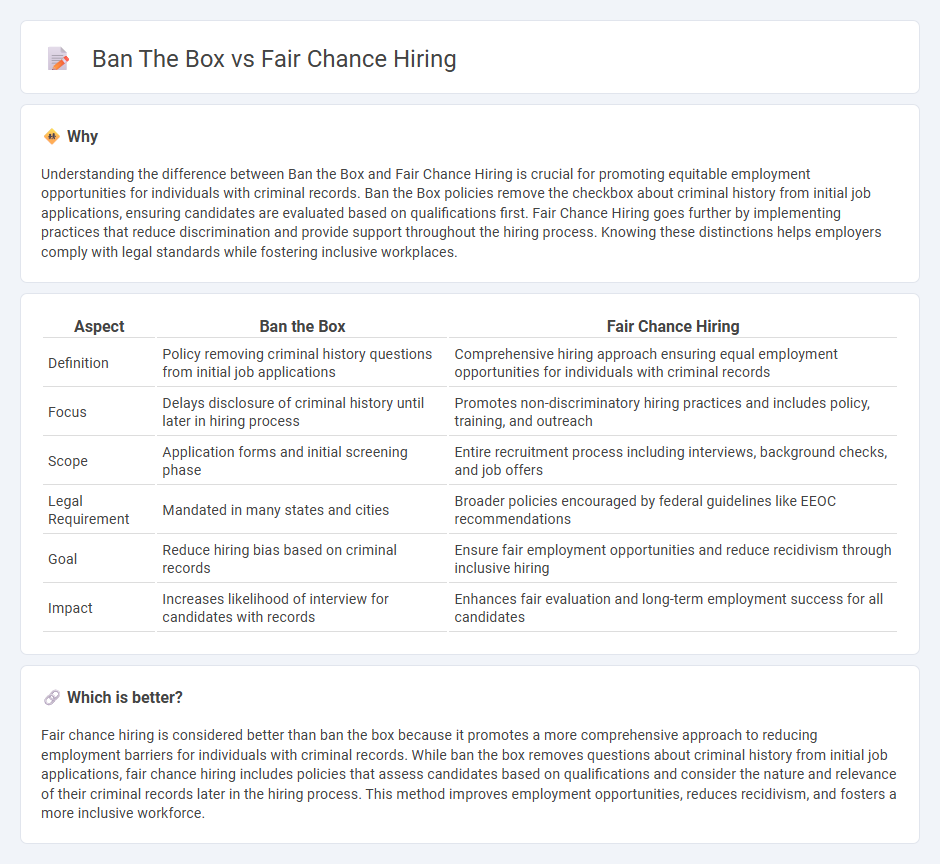
Ban the Box initiatives remove the checkbox asking about criminal history on job applications, aiming to reduce employment barriers for formerly incarcerated individuals. Fair Chance Hiring policies extend this effort by promoting equitable consideration of candidates with criminal records throughout the entire hiring process. Explore how these approaches reshape workforce inclusion and improve employment opportunities.
Why it is important
Understanding the difference between Ban the Box and Fair Chance Hiring is crucial for promoting equitable employment opportunities for individuals with criminal records. Ban the Box policies remove the checkbox about criminal history from initial job applications, ensuring candidates are evaluated based on qualifications first. Fair Chance Hiring goes further by implementing practices that reduce discrimination and provide support throughout the hiring process. Knowing these distinctions helps employers comply with legal standards while fostering inclusive workplaces.
Comparison Table
| Aspect | Ban the Box | Fair Chance Hiring |
|---|---|---|
| Definition | Policy removing criminal history questions from initial job applications | Comprehensive hiring approach ensuring equal employment opportunities for individuals with criminal records |
| Focus | Delays disclosure of criminal history until later in hiring process | Promotes non-discriminatory hiring practices and includes policy, training, and outreach |
| Scope | Application forms and initial screening phase | Entire recruitment process including interviews, background checks, and job offers |
| Legal Requirement | Mandated in many states and cities | Broader policies encouraged by federal guidelines like EEOC recommendations |
| Goal | Reduce hiring bias based on criminal records | Ensure fair employment opportunities and reduce recidivism through inclusive hiring |
| Impact | Increases likelihood of interview for candidates with records | Enhances fair evaluation and long-term employment success for all candidates |
Which is better?
Fair chance hiring is considered better than ban the box because it promotes a more comprehensive approach to reducing employment barriers for individuals with criminal records. While ban the box removes questions about criminal history from initial job applications, fair chance hiring includes policies that assess candidates based on qualifications and consider the nature and relevance of their criminal records later in the hiring process. This method improves employment opportunities, reduces recidivism, and fosters a more inclusive workforce.
Connection
Ban the Box policies remove criminal history questions from initial job applications, promoting fair chance hiring practices that aim to reduce employment barriers for individuals with criminal records. These initiatives help employers focus on candidates' qualifications rather than past convictions, fostering inclusive hiring and reducing recidivism rates. Fair chance hiring increases workforce diversity and supports economic reintegration for marginalized populations.
Key Terms
Criminal Record Disclosure
Fair chance hiring policies promote equal employment opportunities by minimizing discrimination against individuals with criminal records, ensuring only relevant offenses impact hiring decisions. Ban the Box regulations specifically remove the checkbox regarding criminal history from initial job applications, delaying disclosure to later stages of the hiring process to prevent early bias. Explore how these measures differ in scope and implementation to better understand their impact on criminal record disclosure in employment.
Individualized Assessment
Fair Chance Hiring prioritizes individualized assessment by evaluating candidates' qualifications and skills without automatic disqualification based on criminal history. Ban the Box initiatives remove the criminal record question from initial job applications, encouraging employers to consider a candidate's merits first before background checks. Explore how these approaches transform hiring practices and promote equitable employment opportunities.
Application Process Timing
Fair chance hiring initiatives promote evaluating candidates based on qualifications without immediate reference to criminal history, ensuring assessments occur early in the application process. Ban the Box policies specifically remove criminal history questions from initial job applications, delaying background checks until later stages to prevent early disqualification. Explore how timing adjustments impact hiring equity and candidate outcomes in these frameworks.
Source and External Links
A Guide to Fair Chance Hiring for Employers [2025] - Fair chance hiring is a practice that enables people with criminal records to have greater employment opportunities by delaying inquiries about convictions until after a conditional job offer, ensuring decisions are based on qualifications rather than criminal history.
What are Fair Chance Hiring Practices? | Checkr Blog - Fair chance hiring involves employers considering a candidate's criminal record only after an interview and working with partners to recruit fair chance talent, using skills-based interviewing and delaying background checks until later in the process.
What Is Fair Chance Hiring? - Indeed - Fair chance hiring, or ban-the-box laws, delay asking about legal history until later in hiring to allow individuals with prior convictions a fair opportunity to present their qualifications, with 37 states and many localities adopting such policies especially in public employment.
 dowidth.com
dowidth.com